- Home
- George Zebrowski
Brute Orbits Page 7
Brute Orbits Read online
Page 7
John “Jimmy” Barr decided that he would rule the Rock, and women would be the currency with which he would pay his soldiers. The only other source of power might be in controlling access to the mess hall automats.
He was a tall, dark-haired man with implanted teeth. A loose, lanky physique made it seem he was put together from clothes hangers. He had no inner life, except as a planner of actions that he had never executed. He rarely thought about himself except in practical terms, as if he were someone else; he always looked outward, absorbing what he needed to know, synergizing sequences and tracing out orderly steps to their conclusions. He had been caught only once, and it had been as if he had struck a mirror—glimpsing himself as it shattered.
As Barr considered the battles that had already occurred, he saw that there was only one way to end the war—by seizing the mess hall automats and starving out the opposition. He had the force to do so—but then what?
Suddenly he realized how limited the victory would be: access to the most desirable women, and the ability to order the inmates about. But what could they be ordered to do, except to go about their lives of eating and sleeping, maybe running errands, as they all waited for their time to run out?
But what else was there to do? What could there ever be here? The impoverished landscape had almost nothing to offer except a monastic daily life. The ground itself was the prison wall, and could not be penetrated. All the richness of life on Earth was gone, leaving only a bare stage on which there was only one role—waiting for the play to end.
He would not long be able to control his subjects if he failed to give them something to do. For the moment they were faced with the group that was not under his command, some two thousand people, gathered at the far end of the habitat. He had cut them off from the mess automats, but that would not last long. They sat on the hillsides below the sunplate, waiting to get hungry. When they attacked again, his force would attempt to kill them all—at least those who failed to come over to him after the defeat. All he had to do was wait until they became hungry, while his force ate in shifts.
Barr smiled as he stood outside the dome of the first mess hall and considered the difference between his forces and those which had been driven away after the seizing of the women. His people, who included some of the women, were perfectly willing to kill with their hands, or with the makeshift utensils taken from the mess. This fact alone had thrown back the others. The fallen still lay where they had died, and all the dead were on the other side. He estimated a hundred or so.
But as he gazed down the length of the hollow toward the dimming sunplate, he saw a line of figures moving toward the four mess hall domes and behind the line there was another and another.
It was completely unexpected, but he knew at once what was about to happen. Coming so quickly after retreat, this sudden forward swarm was meant to catch his forces off guard. He knew that an all or nothing rush might overwhelm his tired men. But the opposing force was also tired, he told himself, and their thrust might easily fall apart.
Half his men were already coming out of the mess halls and forming up to meet the attackers. The rest were coming out of the barracks at his left, ready to reinforce the men at the mess halls. He saw now that the enemy was sending in every standing individual. They spread out across the landscape of mud and crabgrass, their shadows thrusting forward as the sunplate dimmed toward evening behind them.
He cursed under his breath, realizing that it might go either way; but as he looked ahead to the decades inside this Rock, he welcomed this decisive test; it would at least give him a chance at a more satisfying life here. It would not matter if he lost, because then he would know that he could not have prevailed with the means at hand.
But if he prevailed—ah, what he would do then! What games he would invent!
The first line of figures was almost at the domes, when suddenly they stopped, holding up their hands. He peered ahead and saw that individual figures were coming forward, and others were going out to meet them.
“Come on!” he shouted to the men near him. “We’ve got to get over there!”
He went forward with a thousand men at his back, already suspecting what was happening, knowing that he might already be powerless to stop it.
It was a long march across the crabgrass. Listening to the mumblings and mutterings of the men behind him, Barr felt that he was losing himself, what there was left of him.
At last he came to the open area between the two lines. There was a group of seven men in the middle, talking to each other. They were gesturing, but he could not make out their words. He glanced back at his line and saw the same questioning look on the men’s faces.
Finally, he went forward to the group.
“Well, what is it?” he demanded. “What do they want?”
All seven men looked at him in silence.
“Tell him,” a deep voice said.
Then Arlo Perrin, one of his own men, said, “We’re going to hear from each side. It’s only fair.”
For a moment Barr wanted to laugh; but he saw it was all decided. He nodded his agreement.
“You want to talk first?” asked Perrin.
Barr hesitated, then said, “I’ll listen,” thinking it best to know what he was up against.
The men turned to face the other side. A tall man came forward and stopped between the two lines. Barr recognized him as Ivan Osokin, a quack doctor from Odessa, who had been convicted of too few of his many murders for hire.
Osokin raised his hands. “You all know me!” he shouted. “I’ve helped a few of you, and maybe now I will help all of you!” His tenor voice carried strongly across the fields, and Barr tensed, knowing that the man’s medical skills, however limited and restricted by conditions here, were an undeniable source of power and influence. It had not occurred to him that the old doctor would think of using it.
Osokin pointed at Barr and asked, “What has he done for you, except set us against each other?” He paused. “What does this information thief have to offer? What is he after except to help himself?”
Murmurs spread back through the ranks on each side like the sound of bees swarming. Barr felt his face tingle, as if a front of salty air had struck it. But he smiled and waited for Osokin to finish.
“What have you to say?” Osokin demanded. “What can you offer these people?”
Barr approached him. Osokin did not move away. When Barr was close enough to whisper, he asked, “What is it you want, old man? Share and share alike?” They would be good together, Barr realized, and wished that he had known more about the man earlier.
Osokin’s breath was bad; his teeth were piss yellow.
Barr asked, “Do you really think a lot of talk will get you anything?”
“Of course not,” Osokin said, then reached out and grasped Barr by the throat, holding him at arm’s length.
Barr struggled to grab the arm that held him, but it was like trying to take hold of a tree branch. Osokin lifted him a little, showing astonishing strength, and Barr realized that this had all been about something else. It was a public assassination.
He tried to scratch the bare arm, but its skin and muscles were hard. Osokin lifted him a bit more, and Barr began to dance. Stars exploded in his eyes, and the last thing he heard was a great cheer going up from the great gathering. It came from all sides, beginning loudly, then slowly dying away as he went deaf and blind…
9
Season’s Greeting
JUDGE OVERTON’S PRIVATE CHAMBER
* * *
“Going crazy in prison has nothing to do with the inmates’ criminality. We should have better prisons, but it can’t be helped. It’s just too bad, but that’s less important than the society that will be harmed by their presence.”
“But Judge, consider this: they did the crimes, yes. But should we commit crimes against them?”
“Yes, we should. Many people would say that. The question is whether they are crimes.”
“
Are they?”
“No. Not crimes.”
“But they are.”
“No. You think they are crimes. But it’s only self defense. If you kill or injure someone in defending yourself, you can’t be held responsible for the damage.”
* * *
Tasarov paused, as he had so many times now, before going down the ramp to the engineering level, and looked back at the landscape. Tall grass now covered most of the inner land. As he looked to the far end of the habitat, away from the sunplate, the yellow-orange of the dimming light 66 made afternoon in the hollow—one of the contrasting moments he was beginning to treasure in the life he had made for himself since he had moved into the warden’s quarters below. He lived just down the hall from the now silent radio station, which no one had been able to bring back to life. Someone tried at least once a week, but without success.
He thought lately about how he had taken up the warden’s position, and how most of the men looked to him for opinions. He marked his authority from Polau’s death. Law, he told himself as he went down the ramp, had always been “someone’s law,” a practical instrument wielded by a group or class, enforced by the top gang’s police force, and certainly having little to do directly with the ideal of law as that which stood immune to human tampering, fair to all, not subverted by money and the personal motives of judges. To find himself a judge, even an informal one, almost made him believe that humanity tended to order of some kind as much as it needed air and food. At least a dozen times in the last few months, when conflicts and physical violence had broken out among the men, groups had sided with him, offering to enforce his judgment, and that alone had been enough to quiet the conflagration.
Sometimes he thought that most of the men here were simply tired, and wanted to live day to day, accepting the coming decades with a fatalistic, settled relief. Even the sexual couples had reached a stability of quid pro quo; better to have one protector than being passed around. The “females” would be shared, but with reasonable periods between associations. It amounted to serial monogamy.
As he came down the hallway to his quarters, he saw that someone was waiting for him. A dark figure stood up straight from a leaning position against the wall and said, “Mr. Tasarov, may I speak to you? It’s important.”
Tasarov nodded as he opened the door to his sitting room. He never locked it, not only because he couldn’t find the warden’s keys, but because it didn’t seem to matter, at least so far; the men respected his privacy. A break-in would net nothing, but it would be a sign of deterioration.
He stepped inside, and then aside to let the visitor enter. The man came in and stood before him, and Tasarov saw that he was of slight build, pale skin, and brown hair.
“What is it?” He motioned for him to sit down on the pipeframe sofa.
The man ran his hand through his hair. “Thanks.”
Tasarov sat down in the chair across from him. “What’s your name?”
“Uh—yes…”
Tasarov tried to put him at ease. “Forgot it, did you?”
The young man smiled. “No, it’s not that. My name’s Eddie Dantès.” He took a deep breath as Tasarov smiled. “It’s not my real name. I got it out of an old movie.”
“It was a book long before it was a movie,” Tasarov said. “The Count of Monte Cristo by Alexandre Dumas.”
“Yeah, that was the flick. A real old one. Best breakout movie I ever saw.”
“It’s a great book, too,” Tasarov said, realizing that the young man was avoiding what he had come to say. “You don’t go by your real name?”
“No, not really. I changed it legally…from Sid Smith.”
“So what is it, Eddie? It is Eddie, not Edmond?”
He nodded. “I used it at first, but too many people laughed.”
Tasarov sat back, gave him a questioning look, and waited.
“My problem…is I’m a transsexual. I got fixed a long time ago, when I was eighteen…”
“And you’ve been hiding it here,” Tasarov said with surprise. “Don’t you have anyone you care about?” He had been fairly sure that he knew everything essential about his inmates by now.
“No. But Howes…saw me squatting in the tall grass the other day. I shouldn’t have.”
“And you think he knows? Are you fully functioning…as a woman?”
“I am a woman,” he said. “Inside, I mean. I always was. But I started to hide it in prisons, wearing the right…stuff.”
Tasarov said, “Men in prison frightened you, and it wasn’t much better in a woman’s lockup. You didn’t want to find anyone in prison, man or woman.”
“Right,” Eddie said. “They sent me to one or the other, according to how closely they checked my records.”
“You certainly didn’t give yourself much of a way out, did you?”
“I guess not. What can I do?”
“Find someone quickly,” Tasarov said. “Let him find out—and he may count himself lucky.”
“But what if he’s just gay?”
“It’s a chance you’ll have to take. Why not Howes? He’s not a bad sort.”
“But isn’t he…with you?”
“Not really. But if you two hit it off, you’ll have some of the same protection from me.”
Eddie sighed. “I guess it can’t be better. You think Howes might like me?”
“Who knows? Let him find out about you and himself, and see!”
Eddie gave him a lost look.
“You want me to hold your hand?” asked Tasarov, grinning.
Eddie got up to leave. “No, of course not. Thanks.”
“One thing to remember,” Tasarov said at the door. “When you go out into the grass to pee, make sure no one else sees you.”
■
Later that day, Tasarov smiled to himself as he completed the last sequence of six mathematical proofs. No one on Earth would ever see them, because he would destroy them before he died. It did not trouble him. At the age of ten he had absorbed and restated, in his own words, much of Newton and Einstein, a bit of Hawking, some of it before he even knew their work. He had been just as good, if only in part, because he had not seen the answers. That was what counted; to have devalued his work later as mere duplication would have been stupid. He had often wondered what he would have been like as a mathematician in the swim of accepted social norms; but now he knew: an outsider, seeing through the charade too easily to be happy…
He considered Eddie Dantès’s plight. Those who might learn about him would immediately dream of sharing him. Desperate imaginations would whisper in the night. He would be a treasure to be sought, once his nature was known, and the cooperation that was growing in the face of isolation might be weakened. Each inmate had been forced to find his own way of living with sexual release, and there had been explosions of violence. Evolution’s sexual wind-up toy, the male initiator of future generations, fired blanks here. Another warm body would quiet him for a time, but at the deepest levels lurked a profound despair at the lack of result. At least it seemed that way. Maybe he was giving the old brain’s survivalist discontents too much credit.
What of the gay who knows that he is only “make do” for an otherwise heterosexual lover? He longs for another gay’s sexuality, perhaps even love. He may be assaulted by gays and non-gays alike; gays may assault non-gays; heterosexuals may assault each other, or make do with grim acceptance of the substitute. The flexibility of humankind was multifarious and perverse, and not easy to imprison. If one could say that adaptive evolution was an intentional design, then human ways were not made for prisons of any kind.
As he looked around at Warden Sanchez’s office, it became obvious to him how quick the decision to send out the first Rock had been. No effort had been made to prevent possible access to the warden’s office and quarters, or to the library terminals, baths, and recreation areas for the guards that were on the engineering level of a Rock intended to be kept in close Sun orbit. Clearly, no one cared. Good riddance.
Let people worry thirty years from now.
He continued to worry whether everything would continue to work for some three decades, whether there were enough raw makings for the food in the automats, whether the energy plant, air recyclers, and heat radiators would remain functional. He had no idea if anyone in the hollow could make necessary repairs. Again, his conclusion was that no one cared what happened to the habitat; or else they were very sure of it functioning properly and returning in thirty years.
■
Howes and Dantès became good friends; and after a while more than that. But both were regarded as Tasarov’s property, so no one bothered them. Tasarov wondered whether Eddie was the only one of his kind in the habitat, but he really didn’t want to know. If there were others, they were well hidden and just as well that they were.
Some of the older men were attempting to cultivate small gardens in front of their barracks. Tasarov’s forays through the engineering level with Howes and Dantès, to inventory what was available had turned up flowering plant seed packets in a few of the guards’ locker rooms. They had been meant as a mercy for someone, and now they were received as a miraculous find.
“Who knows,” Howes said, “maybe we’ll find a cat or a dog somewhere. Even a rat would do.”
The engineering level took up some thirty percent of the area under the inner land, Tasarov estimated; and clearly the intent had been to excavate and use all of the available area in time. He had his own suspicions about the engineering level that he wanted to test, but it would take time.
Most of the men, he knew, were sleepwalking through their new life, following the easiest way: sleep and eat, think as little as possible, hang out with comrades, even if the relationships offered no physical intimacy, which was the case for most; still, one could get lucky on a strange day. “Hope makes a man deathless,” Melville had once written. Tasarov accepted the words only if they meant that a man should refuse to think about death in the midst of life, since it was only wise not to poison what time a man had; but there was a point at which denial was an attempt to wear blinders. It just couldn’t be done. Sometimes he felt that prisoners needed their guards, needed a society around them to make sense of their imprisonment.

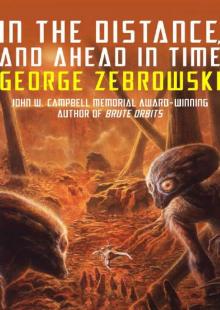 In the Distance, and Ahead in Time
In the Distance, and Ahead in Time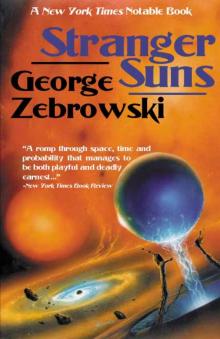 Stranger Suns
Stranger Suns Black Pockets
Black Pockets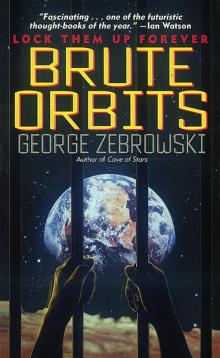 Brute Orbits
Brute Orbits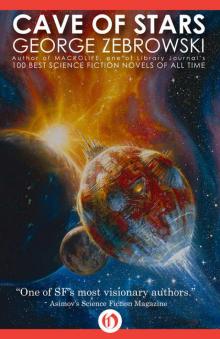 Cave of Stars (Macrolife Book 2)
Cave of Stars (Macrolife Book 2)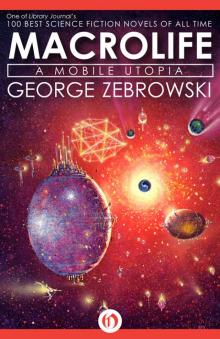 Macrolife
Macrolife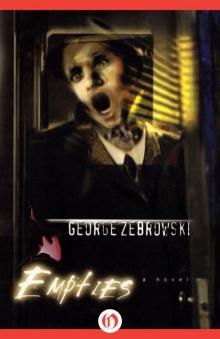 Empties
Empties Heart Of The Sun Star Trek 83
Heart Of The Sun Star Trek 83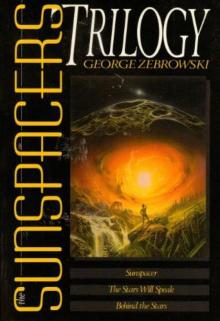 The Sunspacers Trilogy
The Sunspacers Trilogy